The Particulars of the Picture
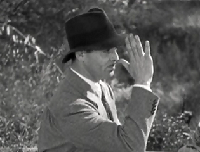 |
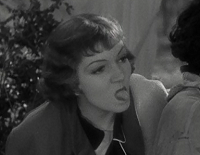 |
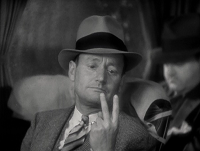 |
| Peter Werne … Clark Gable |
Ellie Andrews … Claudette Colbert |
Shapeley … Roscoe Karns |
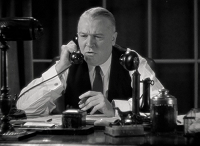 |
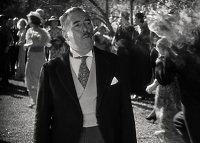 |
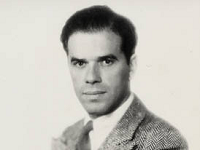 |
| Gordon … Charles C. Wilson |
Andrews … Walter Connolly |
Directed by Frank Capra |
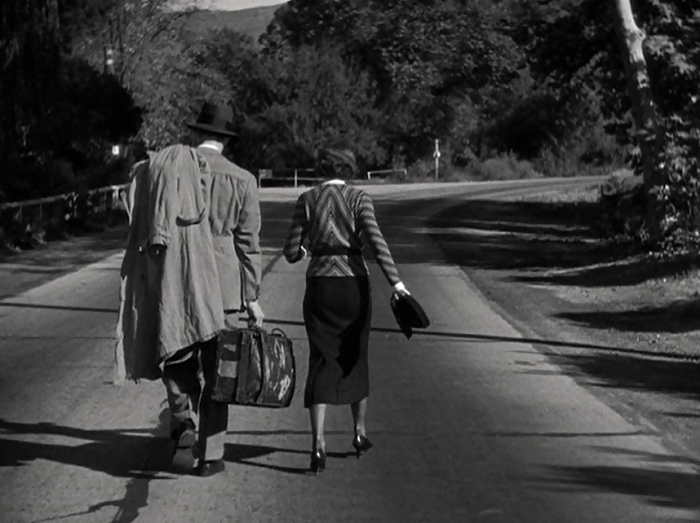
It Happened One Night: Bringing Down the Walls and Everything Else In Between
“I want to see what love looks like when it’s triumphant. I haven’t had a good laugh in a week.”
There few films as uniquely influential, or as uniquely wonderful, as Frank Capra’s It Happened One Night. It’s the roadtrip romantic comedy to end all, with two central performances that are iconic and a legacy that has reverberated though almost a century.
It begins when heiress Ellie Andrews (Colbert) decides to ditch her father’s imprisonment aboard a yacht after he’s forbidden her from returning to her husband King Westley (the ‘King’ is his first name, but also cagily suggests how out of touch the man is). Westley is in New York, so Ellie must make her way there from Florida discreetly, lest she be found by the army of detectives her father has sent out after her.
She decides that taking a bus will be below their radar, and has the misfortune of sitting next to Peter Warne (Gable), a liquored up newspaperman who just got fired. The two take an instant dislike to each other, though Peter becomes concerned when he realizes how bad Ellie is at bus travel; she quickly has her her bag stolen and not soon after misses the bus because the driver didn’t wait for her as asked.
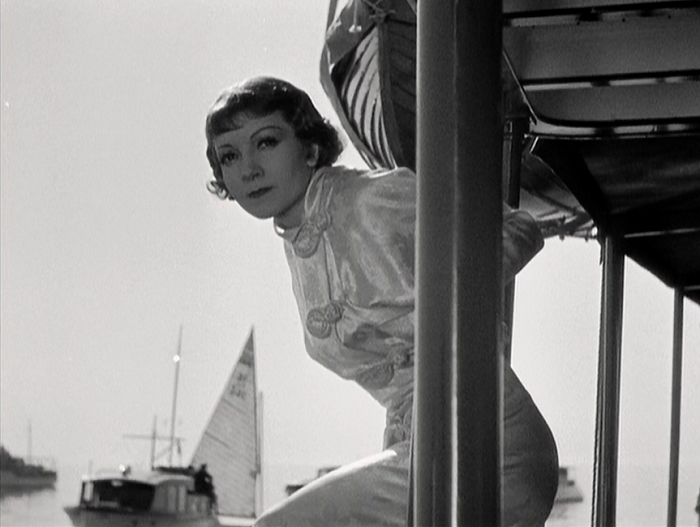
Colbert’s entrance at the beginning of the film pegs her as defiant and petulant. Also a fairly good swimmer.
Peter figures out her secret, and agrees to travel with her and keep her safe just so long as she let’s him write an exclusive story about the adventure. He’ll sell it back to his former editor and make him eat crow.
Unfortunately (and if you’ve ever seen a romantic comedy, you’ll know this next part), neither expect to fall in love with one another. They bicker and banter, and even have moments where they let themselves drop their guards.
The two are separated by a sense of pride as well as their class and experiences, which are all encapsulated by the blanket that Peter uses to separate the sides of the motels they stay in. The Walls of Jericho, as he nicknames his construct, will keep them chaste and pure. It’s what happens when the walls aren’t around that sets off the sparks.

Gable’s excellent entrance (in extreme close-up to show how plastered he is) reveals a man who is overconfident, easily goaded, and who wants to be liked in spite of these qualities.
A lot of the cleverness in the personality clash between the characters of Peter and Ellie comes from the fact that they’re both essentially children. Their petty squabbling comes less from a background of class divide but from an urge to always be right. Gable and Colbert have no qualms in going as silly as they can, and the movie rewards them for it.
Gable huffs and puffs as Peter, filled with gusto and bravado he hasn’t obviously earned. His drinking problem seems to come from more of a childish impetus to show off and be popular than any sort of addiction.
Ellie, who was stuck in a state of arrested development because of her father’s nannying, can’t help but maintain a reserve of sass. She also loves a good putdown, and quickly pegs a good nickname for Peter– “young man”– that shows both disdain and her own superiority.
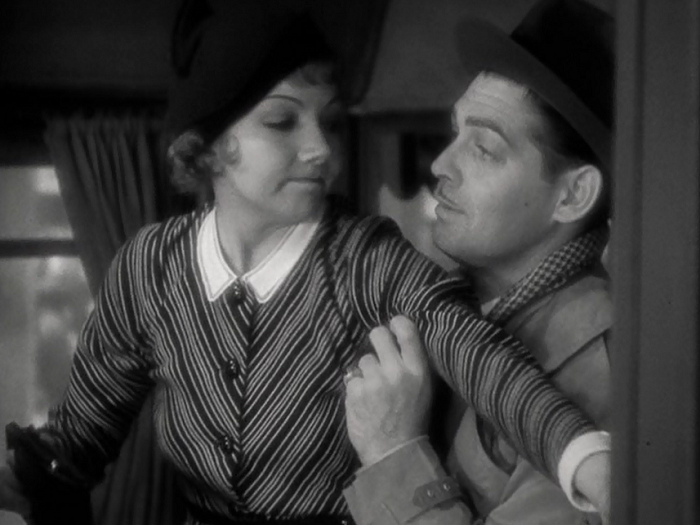
You would not believe how many screenshots I now have of Clark Gable and Claudette Colbert on a bus.
Both traffic in rude gestures and childish debating in a desperate jockeying to prove that they’re right simply because they both believe that they already know everything. The love they find within one another is what finally matures them into adulthood.
There are a couple of great moments I wanted to go over and touch on, since Capra imbues the movie with so many humanizing touches. The first is the scene where hitchhiking Peter and Ellie are picked up by a singing driver played by Alan Hale. Though we in the audience listen to Hale’s weak wobblings, the two in the back seat make private jokes to each other. Not getting to hear their whisperings is a wonderful touch; it makes them the background characters momentarily (which foreshadows a bit of the end), and gives us the opportunity to see just how obvious on the outside it is that the two are falling deeply in love.
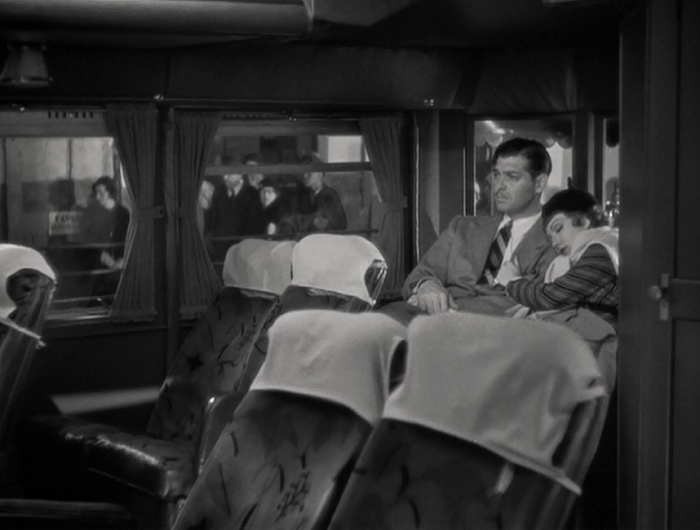
The end shot of a nice pan revealing the entire bus.
Another of my favorite scenes is the last between the newspaper publisher, Gordon, and Peter. Peter again attempts to deflect anything painful or embarrassing to him by saying that the story t about Peter and Ellie falling in love was hooey, but the publisher, who has spent the entire movie being antagonistic, intuitively understands what actually happened. It’s a great reversal of expectations for the character, and nails how Capra and writer Robert Riskin saw humanity: a lot of bluster, but sympathy and humane underneath.
My favorite scene of the movie, though, isn’t the iconic manner in which Ellie manages to hitchhike, nor even the scene of Peter slyly explaining how a man undresses. No, mine is one that’s rarely talked about; after Peter and Ellie have to make a run for it off the confines of a bus, the two find themselves at a stream. Peter hikes up his pants (with Gable looking appropriately silly in the process) and carries Ellie across while the two argue over what, exactly, piggybacking is. It highlights their differences perfectly, and points to why the chemistry is so powerful; even when the point is as meaningless as this, the two go at it with jokes and jabs without holding back. It also results in this wonderful line of pure hooey from Peter:
“You show me a good piggy-backer and I’ll show you a real human. Now you take Abraham Lincoln for instance. A natural born piggy-backer.”
Now that’s a mental image worth watching for.
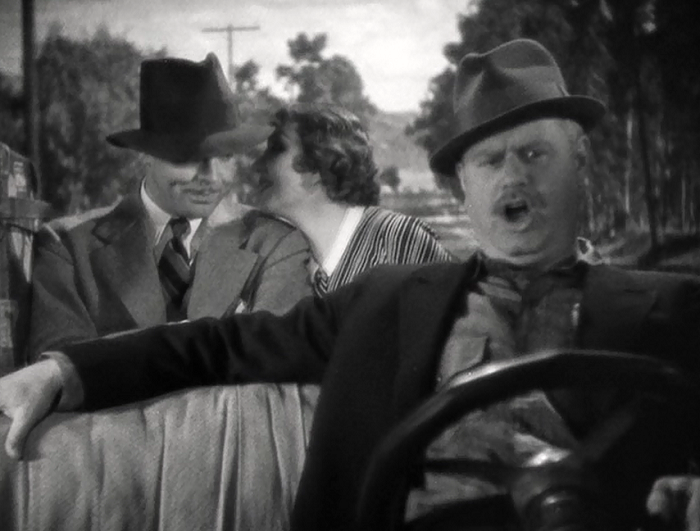
“Psst, I think it’s his son who was on Gilligan’s Island, so stop making Little Buddy jokes.”
“I like ’em mushy.”
Few directors are as well known for their social commentary as Frank Capra, and It Happened One Night is replete with moments that comment on the times the characters live in. It’s a deeply patriotic film without a single instance of the stars and stripes coming out, which speaks a lot to Capra’s credit.
The scenic trip from Florida to New York gives us a vivid glimpse of the world as it was in 1934, from the crooks at the bus station to the poor woman on the bus who doesn’t have enough for money. That’s not to say it still isn’t romanticized in places, but, as Capra often did, he mixes in the bad side of the country with the good, giving the audience an undeniable feeling of the unvarnished reality.
Capra makes great use of the improved mobility of the camera, and the wealth of outdoor scenes present in the final cut feel alive and vital for a studio film from this era. One impressive pan follows Colbert as she makes her way from her room to the outdoor woman’s showers. During these moments we see kids at play, families trying to get their cars to work, conversation abounding… it gives the film vitality, as well as reinforce Capra’s idea of community.
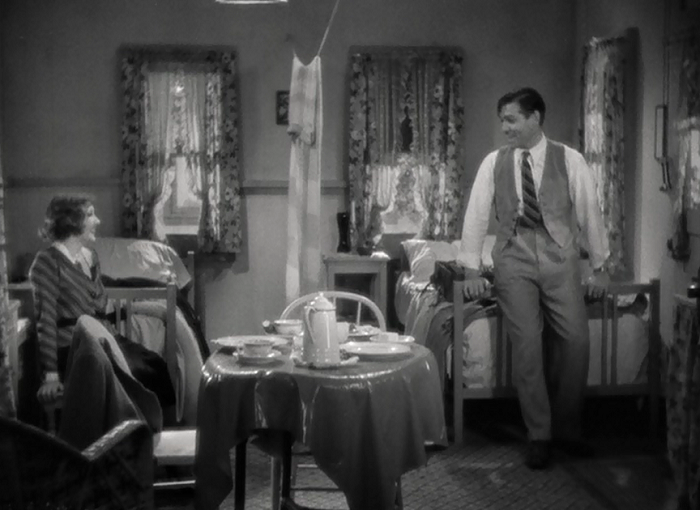
Creating a breezy feeling of real human interaction in such a manufactured scenario is thanks to Colbert and Gable’s great chemistry.
We get this again when a jamboree breaks out on the bus the pair are traveling on. Even Claudette Colbert was skeptical that a whole busload of people would know “The Man on the Flying Trapeze”, but its a solidifying moment that fulfills Capra’s belief that all people, once they can get past money, age or class, were silly underneath. The song itself is such a breezy bundle of nonsense that the whole sequence takes on a warm tone of shared humanity and goodness.
One might hardly notice that the film’s closing minutes don’t contain either sight nor sound of Gable and Colbert. In fact, the last scene of the two actors together actually is a scene of discomfort as they’re still angry at how things turned out, both believing that the other had betrayed their trust. This works much better than so many other variations of the romantic comedy formula since neither acts out of a sense of selfishness, but rather a sense of panic that’s been forming about their encroaching arrival at the gates of something resembling maturity.
Again, this is resolved off screen with the simple blow of a trumpet. Capra, who has carefully built up the metaphor for the Walls of Jericho and with a couple of winks at the audience, gives the ending the movie both a satisfying and deeply suggestive moment to fade out upon. Like they say about kissing, it’s more interesting watch an hour of build-up than five minutes of the act; I think It Happened One Night knows exactly when to cut away.
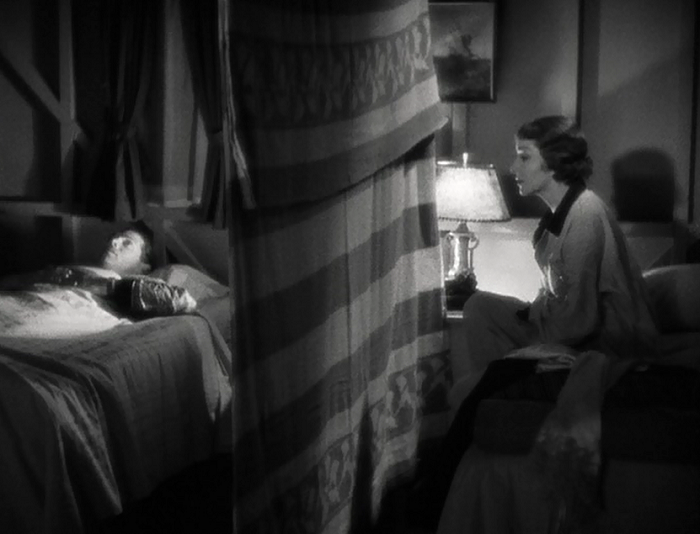
I think it’s fairly clever that the ‘Walls of Jericho’ begin by being filmed at very flat, straightforward angles in their first arrival in the film. Later, when it’s obvious the two are melting for each other, Capra angles it to reflect the wall’s impending doom.
There are damn few things you can say in disrespect to It Happened One Night. Even its 105 minute run time, which would be bloated compared to many flicks of the era, zips by effortlessly. The more movies you’ve seen, the more you’ll appreciate how much charm and energy Capra packs in, and just how naughty and silly Gable and Colbert can get while making it look so effortless. It Happened One Night remains one of the eternal gems in Hollywood’s crown.
Proof That It’s Pre-Code
- It Happened One Night came out in February 1934, five months before the enforcement of the Production Code. However, it’s still pretty light fare. While we get multiple scenes of both actors disrobing, Capra uses these scenes for more than just strict titillation: Gable’s removal of his clothing is a cute attempt to tease Colbert’s sheltered life, and later Colbert gets ready for bed down to her lingerie and it’s a vulnerable moment rather than an exploitative one. These moments are also key to the film’s tempos and themes.
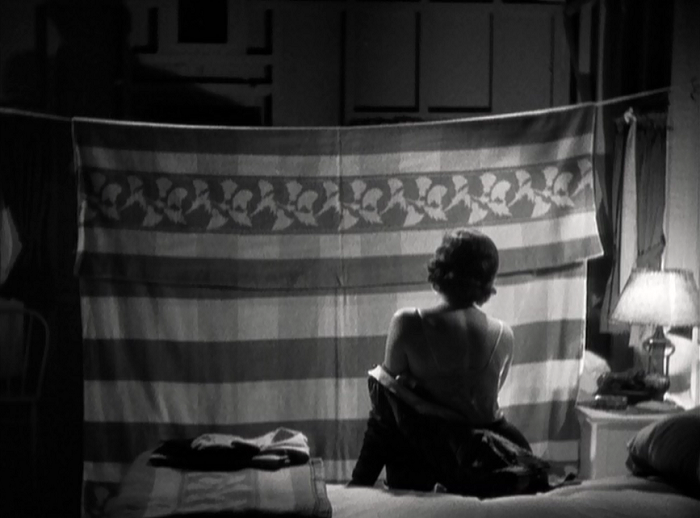
This is both hot and a very beautiful shot.
- Then again, there is Mr. Shapeley, the man on the bus who attempts to pick up Colbert. He talks fast and tosses out a couple of heavily suggestive lines, such as “Yes sir, Shapley’s the name, and that’s the way I like ’em!”. My favorite of these is, “It looks like you’ve got class, yessir, with a capital A!” which seems innocuous until you capitalize the ‘A’. Shapeley later says he’s married, making his bragged conquests Pre-Code, but we could also assume that his admission of marriage is a way to escape being killed. Because it’s just that kind of movie.
Gallery
Here are some extra screenshots I took. Click on any picture to enlarge!
And, since my wife promised to one day read this site, I figured it wouldn’t hurt to have a sexy gallery of sexy Clark Gable. Sexy.
Trivia & Links
- If you’ve seen and loved It Happened One Night, it may surprise you to know that everyone involved in the making of this film sans Capra and writer Robert Riskin loathed to be involved with it. Clark Gable’s first words on set were, “Let’s get this over with.” and Claudette Colbert, after being paid twice her normal rate to do the film, spent the entire shoot complaining. Gable apparently warmed up to it, but Colbert resented it like hell.
- The movie caught on, though, and it’s one of the most acclaimed films by the Academy Awards in its history. It picked up Best Picture, Best Director, Best Actor, Best Actress, and Best Writing. In fact, it won every single Oscar it was nominated for, which is no easy feat.
- And Claudette Colbert, expecting to lose to Bette Davis for Of Human Bondage and in disliking the picture so much, didn’t actually plan on attending the Oscars. She was grabbed from the train station on her way out of town and gave her speech in her traveling suit. I imagine she avoided Davis after the ceremony, since I could only imagine she’d be spitting fire at that point.
- Animator Friz Freleng has claimed that various inspirations for the characters of Bugs Bunny, Pepe Le Pew and Yosemite Sam all came from different characters and moments from this movie. Well, Bugs certainly has Gable’s ears, if nothing else.
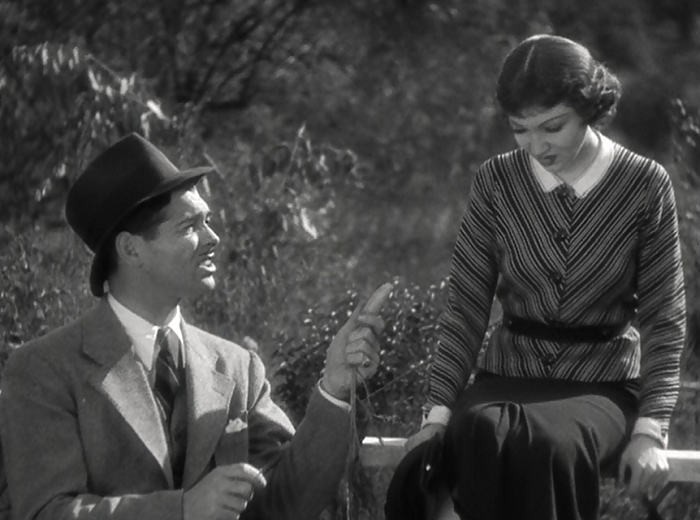
All I’m saying is that in a strictly Freudian interpretation, this is freakin’ hilarious.
- There are plenty of disagreements about what the title refers to since the film takes place over the course of several days and nights. There are three nights in the film in particular that I would say stand out: their first stay in the auto room together, the night where Peter and Ellie admit they love each other, or the very last night they spend together, dropping the walls of Jericho. Pegging the cheeky way the film ends, I’m going to guess the last.
- The always handy James Bernadelli at Reelviews adores this one as much as anyone, and relates a lot of facts and figures about the flick. He also touches on the film’s odd relation to “General Hospital” of all things.
- Mordaunt Hall’s contemporary review for the New York Times was positively giddy over this one. He even spoils this one in the first paragraph, though, really, spoiling the plot of It Happens One Night isn’t spoiling that much; as Bruce Campbell once told me, it’s not the destination that matters, but the journey.
- Variety’s contemporary review ends simply with the word, “Chic.” Indeed!
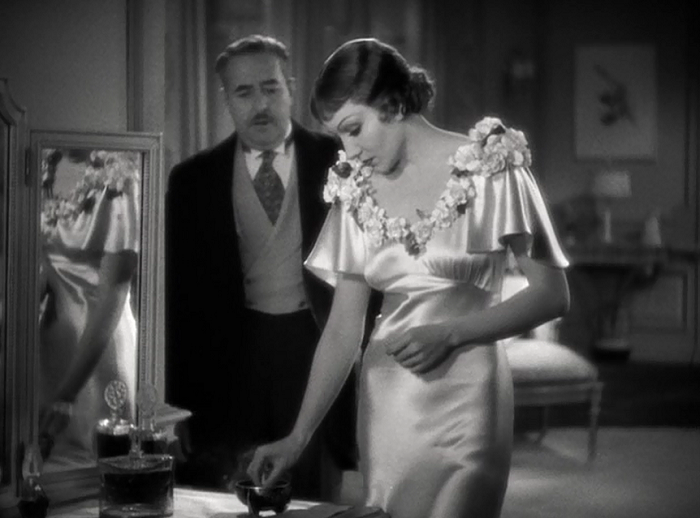
Notably, Colbert only wears four different outfits in the course of the film, ending up in this gorgeous gown. Some actresses even cited this as the reason they wouldn’t do the picture!
- James S. Rich’s writing often knocks my socks off, and he does the best rundown of what constitutes Capra-esque for DVDTalk. He also covers a few other Capra movies I plan on hitting at some point…
- I thought this was interesting more in attempt than execution: a Harlequin writer professes her love for the movie. I don’t often hear Gable described as “super sexy”… well, from anyone outside my wife, I suppose.
- 1934 had 12, yes, 12 Best Picture nominees. Since it’s going to take some time to get around to doing all of those, here are the Becks who go over the entire field. Also of note: of those twelve, Claudette Colbert was in three of them. That’s some damn fancy work.
- Speaking of Claudette, Cliff over at Immortal Ephemera touched on her early career and it makes for a good read. She swore off pictures after her first one, For the Love of Mike (also directed by Capra) and didn’t come back until talkies arrived. Thank goodness they did!
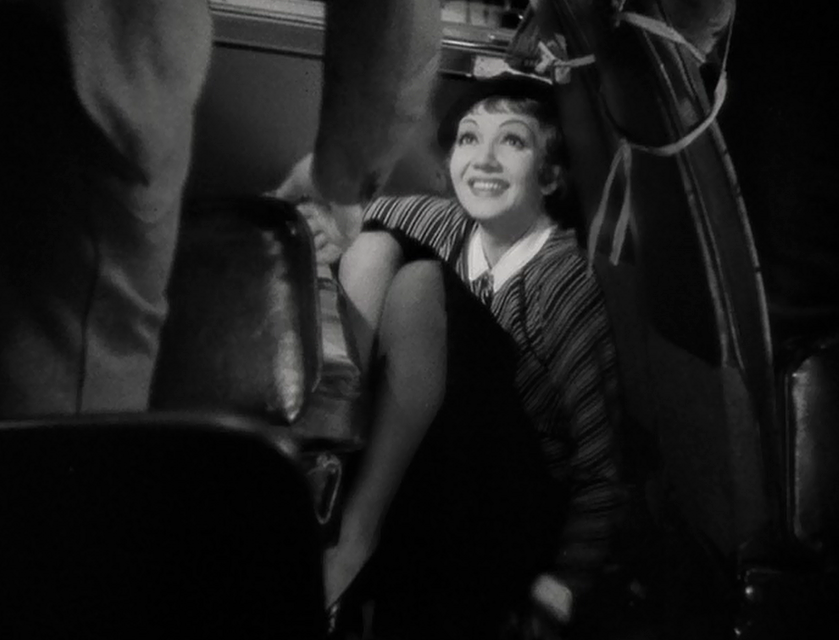
Did someone say Claudette Colbert? Why, I have pictures of her! And, man, did she have gams to spare.
- If you want background and tidbits, MovieDiva knows her stuff, delving into Capra’s love of working for Columbia and the way the characters figured into their Depression-era story. Lots of background information too, and great moments such as this:
Richard Maltby quotes Rene Jordan’s musings that Gable “had a power to give orgasms, even to a generation of women who weren’t too sure whether they were supposed to have them.”
- And, yes, in that last bullet, I’m quoting someone who quoted someone quoting someone else.
- For more of a scene-by-scene breakdown, AMC’s Great Movies Filmsite goes through most of the picture with plenty of lines and notes.
- I read about 80 reviews of this movie to bring this post to you. I’ll be nice and not link anyone, but there are some really damn weird (read: stupid) opinions about It Happened One Night. One person complained it was “too shouty.” Another said that they were a big fan of action films since comedies are “so brainless.” I’m also wondering how many people truly believe the Great Depression was just an era where a great number of people just moping around in, sadly. A lot of writers also seem to think that this was the first romantic comedy ever made. I… what? Here’s my suggestion: don’t read any other reviews written besides the ones I linked here. It’ll make your life that much better.
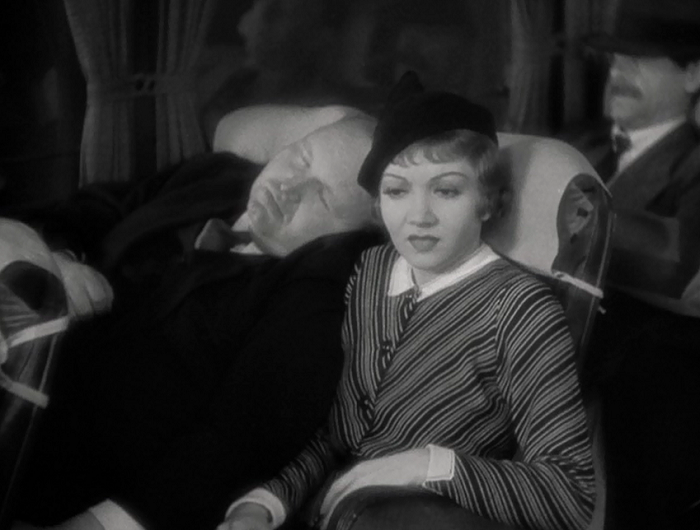
This is what reading badly written reviews of Capra movies feels like to me.
- One final thing: I have never in my entire life actually met someone who dunks their donuts in their coffee. Does that really happen? Or is that a regional and/or 1930’s thing?
- There are tons of posters for this films from many decades of issues and reissues. Here’s the page at Movie Poster Shop, and here’s the one I actually have hanging up on my wall:
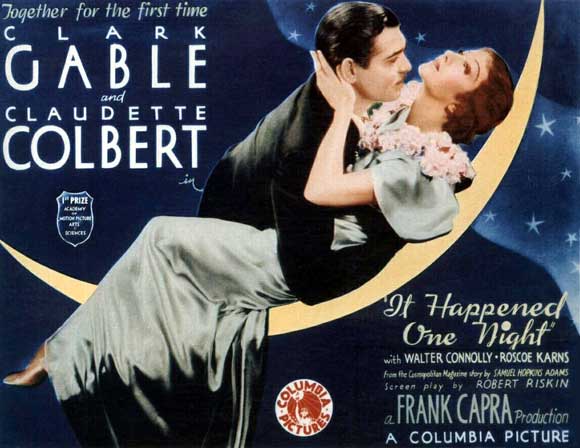
I think it’s both charming as hell and then really drives home that speech Peter gives near the end of the movie about his ideal woman. But mostly it’s charming as hell.
Availability
- This film is available on DVD and Instant Video, and can be rented from Classicflix.
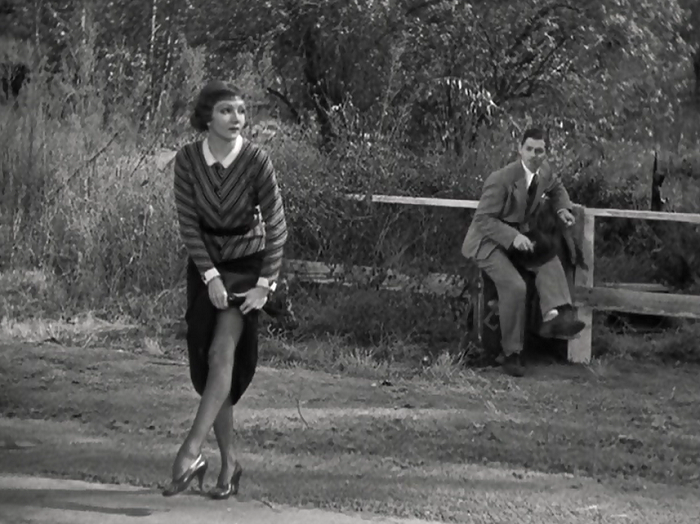

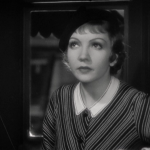
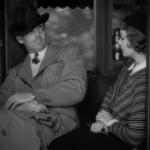
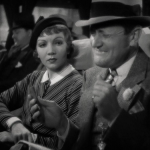
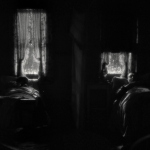
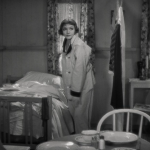
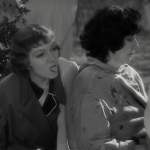
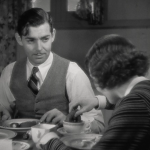
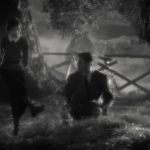
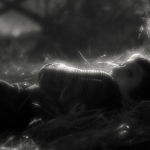
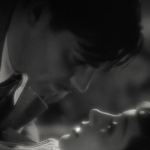
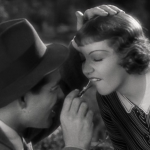
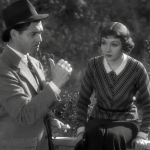
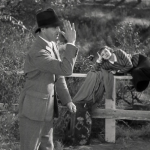
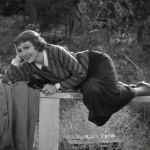
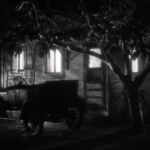
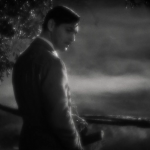
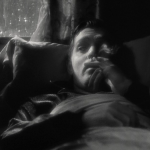
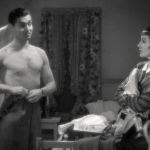
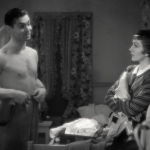




4 Comments
Deni Duntz-Moore · June 19, 2013 at 8:34 pm
One of the things that I like about this movie is that both stars’ performances seem natural and genuine rather than theatrical or overly dramatic as was the acting of many 1930s movies. This movie could easily be adapted almost verbatim for the 21st century if tweaked by the right screenwriter, producer and director.
Danny · June 20, 2013 at 12:47 pm
Gable and Colbert were both at their peak levels of charm with this film, and so rarely were they used in light comedies that it only emphasizes how special this one was. I think this could be adapted, but considering how many movies ripped off the ‘he’s got a secret, she’s got a secret’ romantic plot development and the way the film would possibly lose its subtext about the wretchedness of the Great Depression, I don’t know if its necessary. But the movie is wonderfully, certainly timeless.
Canais Young · May 24, 2018 at 7:46 pm
Correction: Pepe Le Pew is a Chuck Jones character, not a Friz Freleng one (though Pepe was in a Freleng cartoon: 1954’s “Dog Pounded”, which was mostly a Sylvester and Tweety cartoon). Know your animation history.
Janet · March 21, 2021 at 11:23 pm
This is a beautifully written and insightful review of one of my favorite films of all time. I have read a number of reviews of this film but none capture it quite so well as you have here.
Comments are closed.